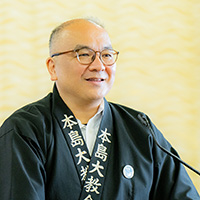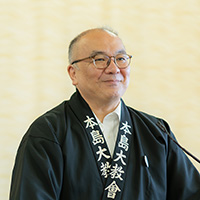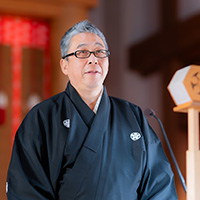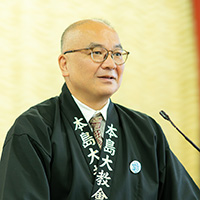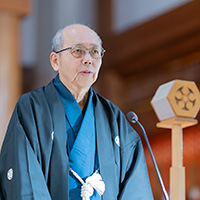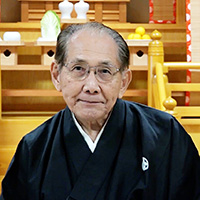
(Summary)
I would like to extend my heartfelt congratulations for completing the last monthly service of the year with Rev. Katayama as the core.
Regarding the parental love of Oyasama, the following is in the Instruction Four:
“On the lunar-calendar date of January 26, 1887, Oyasama withdrew from physical life by shortening Her term of life in order to hasten the spiritual growth of all humankind, Her children. Yet, She remains everliving at the Residence of Origin, providing Her workings and guidance at the forefront of world salvation.”
To respond to Oyasama’s parental love, we have been exerting our efforts for the past three years to bring joy to Oyasama, aiming toward the 140th Anniversary of Oyasama, which will be observed on January 26, 2026.
The time goes by, and there is no end to its flow.
I became a head minister when I was 30 years old, and three years later, I observed the 90th Anniversary of Oyasama. This 140th Anniversary of Oyasama will be the sixth anniversary that I will have observed. It is a seasonable time to bring joy to Oyasama by making progress in our spiritual growth in unity of mind, aligning our minds with the Instruction Four that was announced for this Anniversary. The path to the Joyous Life, however, will continue endlessly, even after Oyasama’s 140th Anniversary.
Some of you may have achieved your spiritual resolutions, and some of you may still be trying, but we have one more month to work on the spiritual resolutions and grow spiritually to bring joy to God the Parent and Oyasama. I think this is a goal that we all share.
There is a Japanese idiom, “fueki ryuko,” which translates to “consistensy and change.” This is a concept Basho Matsuo acquired during his trip in “The Narrow Path to the North,” and it means that in order to be consistent, change is necessary, and in order to change, one cannot ignore consistency—the root is the same.
As we welcome the new year, I don’t think I am the only one who feels the breath of life and the arrival of the beginning, praying many new buds to sprout on trees that showed no change until yesterday.
In the Instruction Four, it says:
“‘Buds sprout from knots,’ She encouraged those around Her by saying that whatever happens is God’s arrangement for guiding people to spiritual maturity.”
I hear that people in Japan this year are going through a difficult time because of the rice price surge. In the path of Oyasama’s Divine Model, after Oyasama became the Shrine of Tsukihi, She gave away everything in the Nakayama Family to “plunge into the depths of poverty.” After 16 years has passed, when Kokan informed Oyasama “there is no rice left in the house for tomorrow.” Oyasama said to Kokan, “In this world there are those who are suffering, unable to eat or even to swallow water despite food piled high at their bedsides. If we think of them, how blessed we are, for when we drink water, it tastes of water. God the Parent has blessed us with exquisite gifts. However wretched you may be, never say you are wretched. For I shall never make beggars of you.” Oayasama gave warm words of encouragement and went through such circumstances with the mind of joyous acceptance.
Also in the Instruction Four, we read:
“‘When you drink water, it tastes of water.’ She taught us to always feel a sense of gratitude for the boundless blessing of God the Parent in any situation as we walk the path,” and I am very grateful for this.
After the war, my family of six had no place to go in the scorched wasteland of Hiroshima, so we lived for several years in my father’s friend’s cattle shed. Our meals were barley, daikon radish, and sweet potato porridge every day. Several years later, when I spent New Year’s at a relative’s house, I was able to have white rice for the first time, I still remember feeling thrilled as a child, thinking, “Wow, I get to eat silver rice!”
I became life-threatening ill when I was in college but made a full recovery. After being told by the doctor, “You were miraculously saved by god in heaven,” I decided to quit college and made a resolution to follow the path.
While my wife and I were serving at Honjima Grand Church as live-in staff, we wanted to experience the Divine Model of Oyasama, even if only a little. So, with the permission from the 3rd grand church head minister, Rev. Toshitsugu Katayama, my wife and I set out to conduct missionary work away from our own church. At the time, I was 27 years old, and my wife was 24.
Both my wife and I were still beginners in the faith. We had only just learned the “Sacred Names given to the Ten Aspects of the Complete Providence” and the “Eight Dusts,” and even while relying on Oyasama’s Divine Model, we really didn’t know how we should convey the teachings to others. With that, we got off at Nakatsu Station.
We immediately thought about going out to spread the fragrance of the teachings, but since we were in an unfamiliar place with nowhere in particular to go, we asked a passerby to tell us where a nearby Shinto shrine was. We climbed the steps, looked out over the town below, and while talking about where we should begin our efforts, we eventually said, “It’s already late, so let’s sleep at this shrine tonight and begin our missionary work tomorrow.” Just then, we heard rustling sounds and sensed someone’s presence, which made us feel uneasy, so we decided to leave the shrine and walked along a road in the village. That was when a woman called out to us, saying, “You don’t look like people from around here. Do you have some business here?” We answered, “We are Tenrikyo missionaries. We just arrived here, but we have nowhere to stay and don’t know where to go.” She kindly replied, “That must be inconvenient. If you’d like, you may use the storage shed at my house,” and thus a place to sleep was settled. We truly felt the wondrous workings of God the Parent and Oyasama.
The next morning, the two of us immediately went out to spread the fragrance of the teachings. I said, “from today, I’m going to fast,” and my wife replied, “then I will, too.” However, by the next day, she broke out in a cold sweat and was crouching down in exhaustion. I wondered if perhaps she might be pregnant, so I bought her a snack bread and had her eat it. This still remains a dear and nostalgic memory for me.
As we continued walking from place to place spreading the teachings, we eventually came to what looked like an elderly care facility. There we met an elderly person who had been bedridden for a long time. When we administered the Sazuke, the smell of excrement and urine was terrible, as if the bedding had not been washed for many days, and the room was filthy, so we were allowed to clean it as well. However, the stench was so overwhelming that at one point my wife couldn’t bear it and had to step outside.
Perhaps out of concern for my wife and me, as we were spreading the fragrance of the teachings without much experience or understanding, Rev. Toshitsugu Katayama sent us a letter asking us to return, and so we resumed our service at the grand church as live-in staff. As we had made a firm resolution to follow the path, we were filled with enthusiasm to tackle any task that was presented to us, hoping to experience even 1/10,000 of Oyasama’s Divine Model.
After completing our service as live-in staff, we received an appointment from Rev. Katayama to become the successor of the N.C. Church based in California, and we moved into the church to begin our life there.
I was embarrassed by doing missionary work; I didn’t fully understand the teachings and above that, conveying them in English was difficult for me. I was turned down and was yelled at, “Be quiet! Get out of here!” I was also told by zealous Christians who chased me down to convert me saying, “Your religion is a cult. Hurry up and open your eyes. You must believe in Christ.” To those people, I couldn’t say anything and I just continued to walk.
At one house, a dog barked at me and even bit my leg. Each time, I composed myself again and continued missionary work, but I wasn’t able to convince anyone with the teachings. At that point, I was so done with it. The internal hesitation and conflict within me continued and I was on the edge into depression.
At that time, I was inspired by the words of God:
Always ridiculed and slandered,
Still I will realize remarkable salvation. (Mikagura-uta, III:5)
Do not grieve over whatever path you are now on.
Take delight in the main path that lies ahead. (Ofudesaki III:37)
In the Instruction Four, we are taught,
“‘Through saving others, you will be saved.’ Oyasama taught that, if we remain singly focused on working for the salvation of others, our minds will gradually become purified without us even realizing it and will allow us to be saved and be filled with joy and brightness.”
At the time of the 100th Anniversary of Oyasama, I had some troubles brought upon myself due to a large debt that I had taken on. In order to experience even a little of the Divine Model of Oyasama, I made a spiritual resolution to quit drinking and smoking.
In the past, the Shinbashira gave us these words in his Spring Grand Service sermon.
It goes without saying that the purpose of studying the teachings is not merely to know them but actually to implement them. We study the teachings to internalize them so that we can live each day in a manner based on the teachings. It is far from easy to become single-hearted with God or to come into complete accord with God the Parent’s intention. Nevertheless, our work toward achieving spiritual growth entails seeking the heart of the Parent constantly and making repeated efforts to near God’s intention.
Unless we are careful, we humans can get caught up in our self-centered imaginations, lose sight of the Parent, and even turn our backs on the Parent. In all matters, therefore, we should make a point of seeking God the Parent’s intention and asking ourselves what Oyasama would do in any given situation; we should always ponder and act in light of the Divine Model as well as of the teachings, which should serve as the yardstick.
This will shape whether or not the decisions and choices we make at important junctures such as life’s crossroads and turning points are in accordance with God’s intention. I believe that we will certainly find ourselves enabled to know which direction to take if we purify our mind and seek out the path to accord with the divine intention based on the teachings.
Living as we do in this day and age, I am sure we sometimes face dilemmas and difficult decisions that our predecessors never had to deal with. At such times, we can base our ponderings on the following Divine Direction:
Sah, sah, because Tsukihi exists, the world exists. Because the world exists, things exist. Because things exist, your bodies exist. Because your bodies exist, law exists. Although the law exists, to resolve your minds is primary.
Osashizu, January 13, 1887
For the 110th Anniversary of Oyasama, I made the spiritual resolution to return to Jiba every month from America and continued for 12 years. As I contemplated “What is the pilgrimage to Jiba?” I struck upon the idea to conducting water purification and then dancing the Twelve Songs of the Service in front of Oyasama’s gravesite for a year. Summer is fine, but the pain from water purifications in the middle of winter were so intense that it felt like I was having my flesh cut open.
Although I am still inexperienced, I went through these, hoping to experience even a little of the Oyasama’s hardships, and after visiting the Foundress’s Hall, a deep sense of gratitude for being guided back to Jiba welled up within me. At that point, I felt I was able to find the answers that addressed my various worries. I don’t know exactly what is, but when I sit alone before Oyasama, it strangely removes many of my anxieties. My heart becomes calm and peaceful, and I feel like I receive energy.
Furthermore, I was doing hinokishin like pulling weeds at church headquarters, Honjima Grand Church, and the followers’ dormitory, as well as doing missionary work during the day.
I shall let you work by the truth of you mind. One person can face myriads solely by virtue of the mind. God rides on the mind and works. As long as the mind is firm, God will ride the mind and work freely and unlimitedly.
(Osashizu: October 2, 1898)
In 1881, when the stone for the Kanrodai was being transported from Takimoto Village, the cart stopped moving when it reached the gate of the Residence. At the very moment, Oyasama appeared from Her room and shouted, “Yoisho!” and upon hearing Her voice, everyone pushed together with all their might and the cart rolled in easily. Everyone was deeply moved by Oyasama’s solemn and inspiring presence at that time, as described from Story 82 of the Anecdotes of Oyasama, “Yoisho!”
This is an episode that allows us to vividly picture the scenes of those days. Especially during this particular season, as we approach the Anniversary of Oyasama, the divine image of Oyasama should provide every Yoboku the courage to take that next step in every aspect of our lives. At this very moment, regardless of whether we are consciously aware of it or not, Oyasama is calling out to our hearts with a powerful and encouraging “Yoisho! (Heave-ho!).”
Let us make a mutual pledge to bring as many people as possible back to Jiba, and let us go through each day relying on the Divine Model of Oyasama.
Thank you for your kind attention.
(Edited by Honjima Tsushin Editorial Staff)
